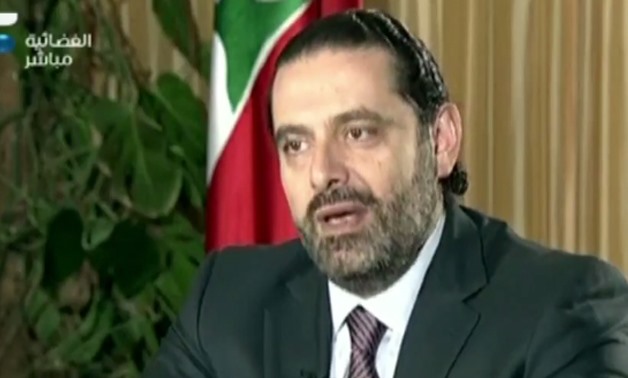
Resigned Lebanese Prime Minister Saad al-Hariri – Live screenshot from the interview
CAIRO – 12 November 2017: Refuting claims of his forcible detention, Lebanese Prime Minister Saad al-Hariri, who announced his resignation recently, appeared Sunday in an interview with Future TV, a station affiliated with the Future Movement Party.
Speaking from Saudi Arabia, Hariri asserted "I am free" and announced that he would return to his country within a few days. He dismissed reports that his residence in Saudi Arabia was against his will.
On November 4, the 47-years-old Lebanese Sunni politician unexpectedly declared his resignation in a pre-recorded message, during his visit to Riyadh. He said in the televised speech that he feared for his life and accused Iran and its proxies of destabilizing his country and the region. Hariri’s resignation has raised regional and international controversy, threatening of a political crisis in Lebanon.
In Sunday's live interview, Hariri said he planned to return to Lebanon to confirm his resignation in accordance with the constitution. But he also said that if he rescinds his decision to quit, the Hezbollah movement must respect Lebanon's policy of avoiding regional conflicts.
Hariri spoke out following intensive pressure from Lebanese officials, who said his resignation was not accepted because it was declared in Saudi Arabia. He said his resignation was his decision, dismissing reports he was forced to quit a unity government with Hezbollah.
Hariri described his decision to resign as necessary move to “cause a positive shock” to the Lebanese political scene, warning against what he said was Iranian interference that is ruining relations with other Arab countries.
Hariri served as prime minister from 2009 to 2011 and took office again in 2016.
Lebanon President Michel Aoun said before the interview that the “mysterious circumstances for Hariri’s stay in the Saudi capital of Riyadh makes all his positions questionable and in doubt and not of his own volition.”
Saudi Arabia, the United Arab Emirates, Kuwait and Bahrain have issued last week advisories to their citizens about traveling to Lebanon and urged those who are in the country to leave as soon as possible.
They warned would-be Lebanon visitors about “safety considerations."
In 2016, Bahrain, Saudi Arabia, the UAE and Kuwait had ordered their nationals to leave Lebanon after they considered that Hezbollah, the armed group fighting in Syria alongside the regime, controls Lebanon's political leadership. The UAE has not lifted its travel bans on Lebanon since then.
Comments
Leave a Comment